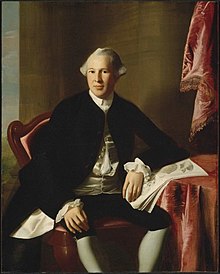Joseph Warren
| Joseph Warren | |
|---|---|

Portrait by John Singleton Copley, c. 1765
|
|
| Born |
June 11, 1741 Roxbury, Province of Massachusetts Bay |
| Died | June 17, 1775 (aged 34) Charlestown, Province of Massachusetts Bay |
| Place of burial | Forest Hills Cemetery |
| Allegiance |
|
| Service/branch | Colonial Patriot militia |
| Years of service | 1775 |
| Rank | Major general |
| Battles/wars | |
| Relations | Mercy Scollay (fiancée) |
| Signature | |
Dr. Joseph Warren (June 11, 1741 – June 17, 1775) was an American physician who played a leading role in American Patriot organizations in Boston in the early days of the American Revolution, eventually serving as President of the revolutionary Massachusetts Provincial Congress. Warren enlisted Paul Revere and William Dawes on April 18, 1775, to leave Boston and spread the alarm that the British garrison in Boston was setting out to raid the town of Concord and arrest rebel leaders John Hancock and Samuel Adams. Warren participated in the next day's Battles of Lexington and Concord, which are commonly considered to be the opening engagements of the American Revolutionary War.
Warren had been commissioned a Major General in the colony's militia shortly before the June 17, 1775 Battle of Bunker Hill. Rather than exercising his rank, Warren served in the battle as a private soldier, and was killed in combat when British troops stormed the redoubt atop Breed's Hill. His death, immortalized in John Trumbull's painting, The Death of General Warren at the Battle of Bunker's Hill, June 17, 1775, galvanized the rebel forces. He has been memorialized in the naming of many towns, counties and other locations in the United States, by statues, and in numerous other ways.
Joseph Warren was born in Roxbury, Province of Massachusetts Bay, to Joseph Warren and Mary (Stevens) Warren. Through an entirely paternal line, he was a direct descendant of Richard Warren, one of the English Dissenters who came to Massachusetts on the Mayflower in 1620 and was the twelfth signer of the Mayflower Compact. Genealogists can trace his more distant ancestry back to a Norman baron who was an uncle of William the Conqueror. His father was a respected farmer who died in October 1755 when he fell off a ladder while gathering fruit in his orchard. After attending the Roxbury Latin School, Joseph enrolled in Harvard College, graduating in 1759, and then taught for about a year at Roxbury Latin. He studied medicine and married 18-year-old heiress Elizabeth Hooten on September 6, 1764. She died in 1772, leaving him with four children: Elizabeth, Joseph, Mary, and Richard.
...
Wikipedia
